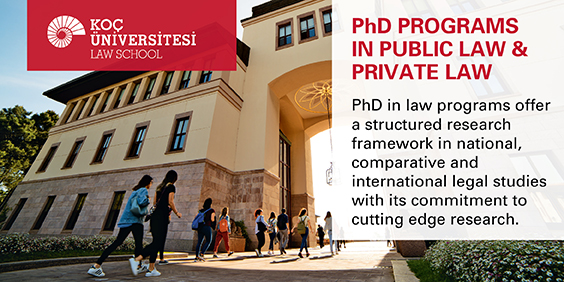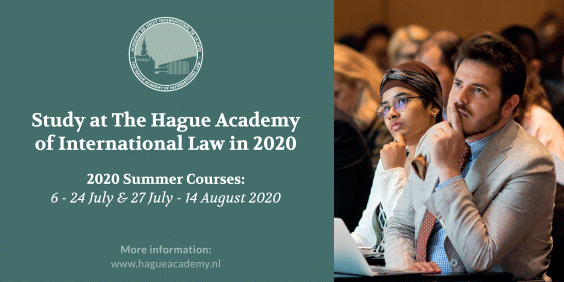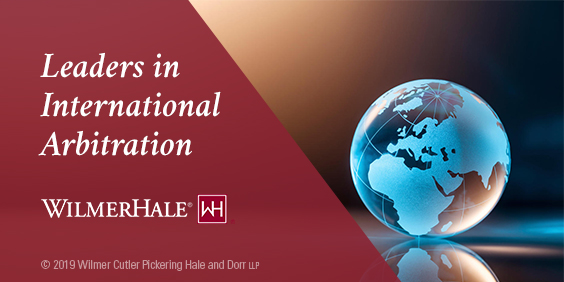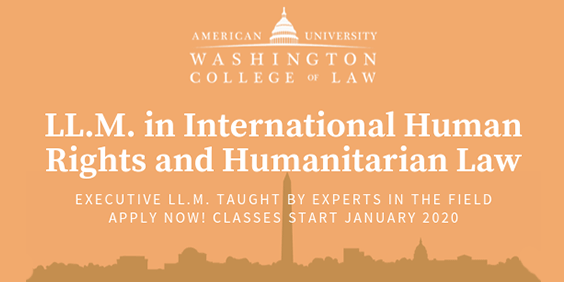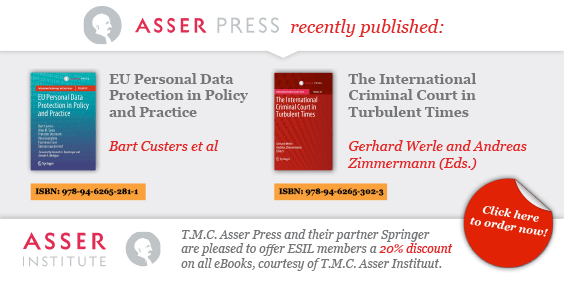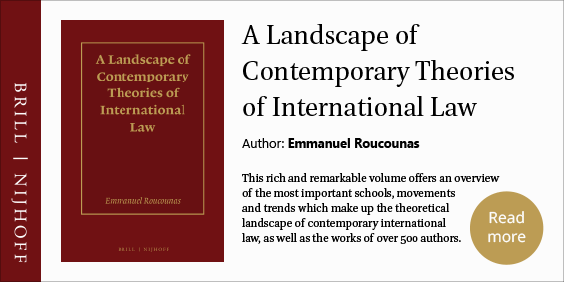Newsletter SEDI : Octobre 2019
Editrice: Sandrine Maljean-Dubois (University of Aix-Marseille)
 Dans ce numéro:
Dans ce numéro:
1. Message du Président
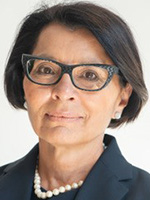
Photini Pazartzis
At the 15th Annual Conference in Athens in September, I had the honour of being elected President for the next two years. I am grateful to my fellow Board members for entrusting me with the helm of the Society, and I hope than I can contribute to its further development.
I wish to thank my predecessor, Luis Hinojosa, for his dedication in leading the Society for the last two years; we have greatly benefited from his wisdom and diplomacy. The Executive Committee was partially renewed in Athens. The three Vice-Presidents are Pierre d’Argent, who is also Treasurer, Fulvio Palombino and Ramses Wessel, and Veronika Bilkova continues as Secretary-General. In addition, Sandrine Maljean-Dubois has been co-opted to the Board for two years as the local organizer of the 2021 annual conference in Aix-en-Provence. And, as always, we are grateful to Joyce Davies, our ‘institutional memory’, and her team at the European University Institute for their valuable support.
The European Society of International Law is an ever-growing, dynamic network of academics, researchers, judges, practitioners and students with an interest in the field of international law. Since the inaugural meeting in Florence in 2004, in the 15 years of its existence, the Society has developed and consolidated its presence as a vibrant forum for the interaction of international lawyers, from Europe and beyond, with a view to encouraging and promoting the study of international law in an increasingly globalized context. The Society is proud that its membership has steadily increased, with members coming from more than 100 countries, thus transcending a European dimension to be a global network promoting the idea of the universality of international law, of diversity and openness.
Within our Society, members and friends have ample opportunities to come together to debate, discuss and collaborate. The major ESIL events are its annual conferences, held in a different venue each year: following the conference in Athens, the next annual conference will take place in Stockholm in September 2020, and our colleague Pal Wrange and his team are already quite busy with the preparations of what looks to be another stimulating rencontre, with the overall theme: Changes in international lawmaking: actors, processes, impact. The call for papers will be out soon. Following that, the 2021 conference will be in Aix-en-Provence.
The annual Research Fora aim more specifically to promote engagement with early-career members of the Society on research in progress; the 2020 Research Forum will be held in Catania on 23-24 April 2020, with the theme Solidarity: The Quest for Founding Utopias of International Law.
The Society also organizes and supports events in Europe and in other parts of the world. We are very happy that these events are flourishing and enhance the visibility of the Society to a wider audience. We are already looking forward to the ESIL-Joint Event: Socially Responsible Foreign Investment Under International Law, which will be held at the Católica Global School of Law in Lisbon on 24-25 October 2019; the programme is available here. Following that, a joint conference on The crisis of multilateral international order: causes, dynamics and consequences, organized by our Society, the Warsaw School of Economics and the Institute of Law Studies of the Polish Academy of Sciences will take place in Warsaw on 22-23 November 2019; the programme is available here.
ESIL members have a further opportunity to interact within the 16 interest groups of the Society, each devoted to a specific area of international law. Many members are involved in the work of the interest groups, which are very active throughout the year and have contributed to creating lively communities within the Society focusing on the exchange of ideas in their specialized fields.
As current President, along with the Board members, I will continue to build upon the work that has already been achieved by our predecessors. We look forward to strengthening our membership, in particular in the periphery of Europe and among the next generation(s) of scholars, and to providing an array of opportunities for the ‘community of internationalists’ to meet and engage with each other. Please follow our website to be informed of all of our activities, including calls for papers for ESIl events, and consider contributing to the newly-established teaching corner, a space where academics can share their teaching methods.
We count on your continued support and involvement in the work of our Society. I look forward to working with all of you over the next two years!
Photini Pazartzis
2. Éditorial de l’invité – Le multilatéralisme, permanence et adaptation
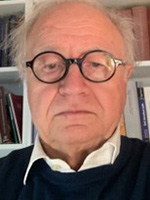
Yves Daudet
Avec le XXIème siècle, le monde change et surtout change brutalement ou de manière accélérée, principalement par le jeu des techniques. Dans les pays occidentaux (mais pas eux seuls) les inégalités se sont creusées et la mondialisation, telle qu’elle a été pratiquée, est à l’évidence responsable de ces excès. S’il est totalement irréaliste d’envisager d’y mettre fin (n’a-t-elle pas d’ailleurs toujours existé sous d’autres formes et d’autres dénominations dès lors que des communications commerciales et humaines se sont développées), il serait en revanche raisonnable d’y introduire des éléments sociaux et des garde-fous. Bref, de maîtriser la mondialisation. Ce qui ne peut se faire que par des outils multilatéraux dans des cadres de négociation.
Cependant, le contexte est rendu difficile par les populismes, le nationalisme étroit ou le protectionnisme à courte vue dont, parmi d’autres, le Président Trump et ses émules à la tête d’autres pays sont le porte-drapeau. Toutefois, lorsque est évoquée la vie internationale, la tendance est de s’en tenir à ses acteurs institués, principalement les Etats, en oubliant les «individus » en dépit des théories critiques de juristes célèbres.
Sans doute donc est-il temps de mettre en œuvre des mécanismes de souveraineté partagée et que, avec des acteurs étatiques traditionnels, des ONG compétentes et responsables participent de manière plus systématique et plus équilibrée aux négociations multilatérales. Elles exprimeraient sans doute mieux que les représentants officiels certaines préoccupations ou revendications des acteurs sociaux et des individus, de l’opinion publique en un mot, opinion dont l’expression dans un cadre interne a aujourd’hui des répercussions au plan international qu’elle n’avait pas auparavant lorsque n’existaient pas les réseaux sociaux et les systèmes de communication instantanée permettant d’atteindre et de mobiliser en un instant des milliers de destinataires.
Le multilatéralisme n’est donc pas appelé à disparaître comme on le dit parfois. Il est en revanche appelé à changer dans son contenu comme l’exige toute adaptation au réel. Si les Etats-Unis de Trump rejettent le multilatéralisme et en menacent l’existence, est-ce la Chine de Xi Jinping qui viendrait à son secours? La Chine en effet exerce un rôle croissant au sein des Nations Unies dont elle devient le deuxième soutien financier derrière les Etats-Unis, elle participe activement aux opérations de maintien de la paix par l’envoi de contingents et la mise à disposition de réserves mobilisables immédiatement, ce qui s’accompagne naturellement d’une augmentation de l’influence politique et d’une présence accrue – ou d’une pression à cet effet – au sein des organes de l’organisation. De manière plus générale la Chine se déclare attachée au multilatéralisme et donc en défend l’existence. Naturellement, le multilatéralisme ainsi mis en avant comporte un contenu à la mesure des intérêts de son promoteur, à charge pour les partenaires d’en discuter. Mais on rappellera que le président Obama l’avait compris en opérant un transfert vers l’Asie des préférences américaines traditionnellement tournées vers l’Europe. Il est de l’intérêt de tous de prêter une attention à ce nouveau contenu d’un système qui perdure: le multilatéralisme.
3. Conférence Annuelle de la SEDI 2019

The 15th Annual Conference of the European Society of International Law took place in Athens, Greece, hosted by the National and Kapodistrian University of Athens and organized by the Athens Public International Law Center (Athens PIL) of the Law School. The Conference, entitled “Sovereignty: A Concept in Flux?” was held from 12 to 14 September and was attended by more than 500 participants. The conference took place at the main building of the University of Athens, and the formal opening, in the prestigious Aula, was held in the in the presence of H.E. The President of the Hellenic Republic, Professor Prokopios Pavlopoulos who delivered the opening speech. This was followed by a keynote address by Professor Yves Daudet (Université Paris-I Panthéon Sorbonne), setting the theme of the conference.
The aim of the conference was to revisit state sovereignty in international law and the current challenges that call into question its basic contours. In keeping with ESIL tradition, the conference featured keynote speakers, a closing discussion round table, and six fora, exploring the normative, theoretical and practical aspects of sovereignty. In addition, twelve agorae, with speakers selected on the basis of calls for papers, examined more specific aspects of state sovereignty in various areas of international law: economic law, environmental law, law of cyberspace, maritime law, law of culture, use of force, refugee and migration law and international dispute resolution. In all, 90 speakers from more than 30 countries participated in the fora and the agorae of the conference. Among them, judges from the International Court of Justice (ICJ), the International Tribunal on the Law of the Sea (ITLOS), the International Criminal Court (ICC) and the European Court of Human Rights (ECtHR); members of the International Law Commission (ILC) and the UN treaty bodies; national supreme court justices and legal advisers to international organizations and Ministries of Foreign Affairs; distinguished academics from world-renowned research institutes and more than 50 universities worldwide; eminent practitioners from leading law firms; and a number of scholars who discussed the future of international law in 14 ESIL Interest Groups, held prior to the main conference.The welcome reception was hosted at the Presidential Palace and the Gala dinner was held at the Stavros Niarchos Foundation Cultural Center.
A conference volume is under preparation. In the meanwhile, more information, photos and posts from the works of the conference are available on the conference website and via the Athens PIL social media (Twitter: @AthensPIL and Facebook: @athenspil).
We are looking forward to the next annual conference in Stockholm in September 2020!
4. ESIL Reflections
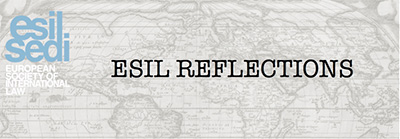
ESIL Reflections are short papers published on the website of the European Society of International Law (ESIL). ESIL Reflections offer up-to-date reflections on current issues in international law. The Reflections are now in their sixth year, covering a wide range of topics relating to current developments in international law and practice as well as theoretical reflections in a way that is relatively accessible to non-experts. The aim is to foster discussion between ESIL members and international law scholars and practitioners more generally – in Europe, but also beyond. ESIL Reflections are published online and distributed freely to ESIL members.
The editors are Federico Casolari, Patrycja Grzebyk, Ellen Hey, Guy Sinclair and Ramses Wessel (editor-in-chief).
ESIL Reflections are short papers (3000-4000 words) that argue one particular point that may trigger further debate in the scientific community. Extensive referencing is to be avoided. References are only necessary in case of direct citations or when new or less well-known works are mentioned.
Latest publications are:
- Filling the Empty Box – A Principled Approach to Meaningful Human Control over Weapons Systems, by Daniele Amoroso.
- Rethinking the Conservation of Marine Biodiversity beyond National Jurisdiction – From ‘Not Undermine’ to Ecosystem-Based Governance, by Vito De Lucia K. G.
5. News from Interest Groups

ESIL Interest Groups are a vital part of the Society’s success and activities. A list of the groups is available on the ESIL website. Reports of recent activities and upcoming events are available in the full text of the Newsletter.
Interest Group on Business and Human Rights:
The IG on Business and Human Rights jointly organizes with the BHRights Initiative (Copenhagen Business School) and the International Association for Business and Society (IABS) an interdisciplinary workshop on business and human rights. This event aims to bring together scholars from diverse backgrounds (e.g. international business, philosophy and political science) to share their current research and discuss topical themes such as the role of businesses in conflict zones, access to justice, human rights due diligence and corporate liability. This workshop takes place back-to-back to the annual UN Forum on Business and Human Rights on the 23-24 November 2019 at the University of Geneva.
Interest Group on the Law of the Sea
The Interest Group on the Law of the Sea organised a pre-conference workshop entitled ‘Sovereignty at Sea: Repercussions in flux?’ in Athens on 12 September 2019. Interesting presentations were given by Joanna Mossop, Irini Papanicolopulu, and Nilufer Oral (who also acted as chair) to start off lively discussions on, amongst others, the BBNJ negotiations, humans at sea and the effects of climate change. Many thanks to the presenters and to all other participants!
Interest Group on the History of International Law
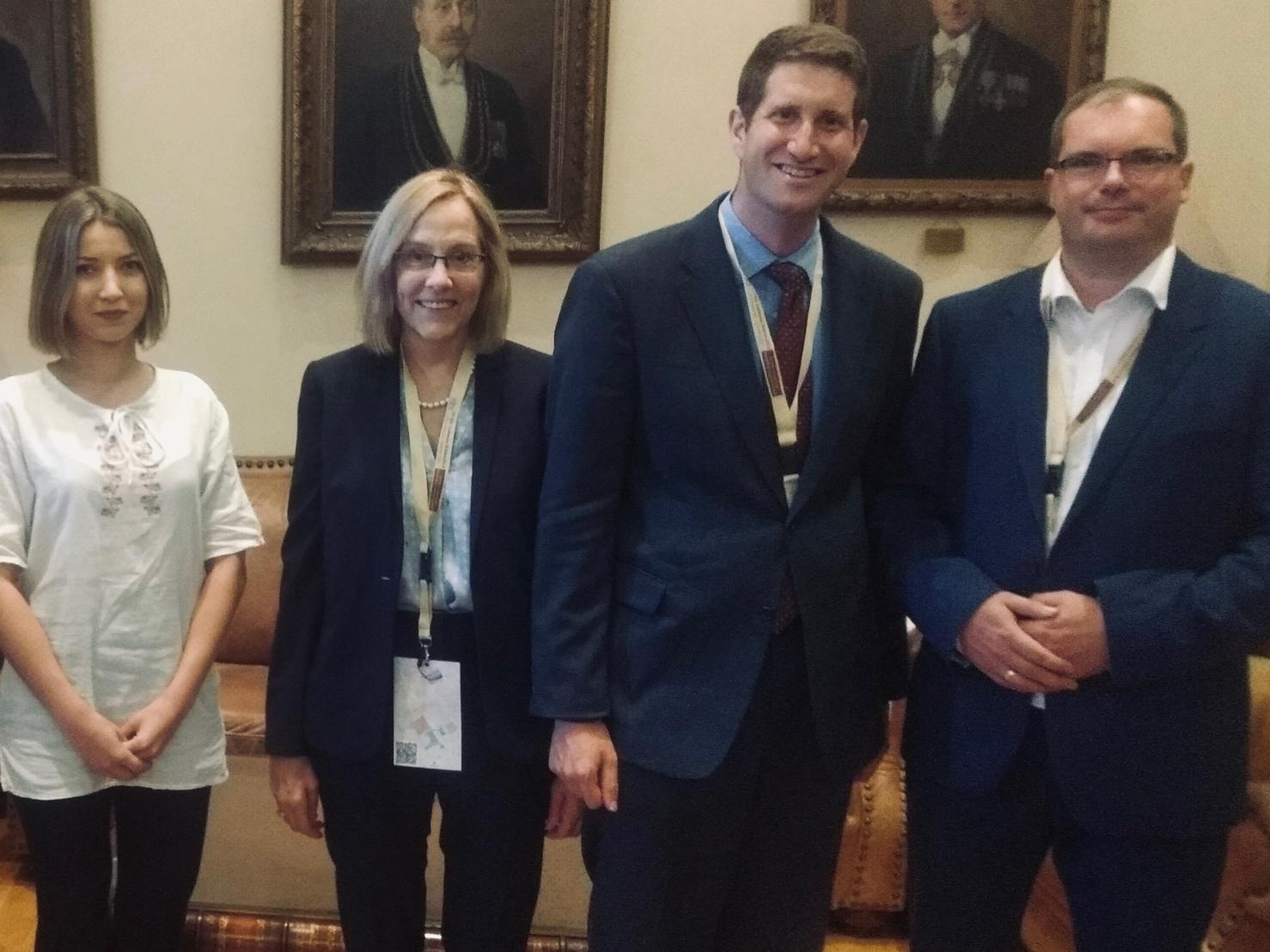 After a successful IG event with four exceptional papers on ”New Histories of Sovereigns and Sovereignties” in Athens, we are currently preparing a call for an IG event on ”Solidarity” at the ESIL Research Forum in Catania next year, focussing on the period of the long 19th century until the end of WWI. Please continue to check our blog for updates.
After a successful IG event with four exceptional papers on ”New Histories of Sovereigns and Sovereignties” in Athens, we are currently preparing a call for an IG event on ”Solidarity” at the ESIL Research Forum in Catania next year, focussing on the period of the long 19th century until the end of WWI. Please continue to check our blog for updates.
We are also looking at elections for our Coordinating Committee. Submissions are expected by 20 October 2019, please check the information in the Secretariat’s email. Of our current team, Frederik, Jan, and Markus will be running for reelection.
Interest Group on Peace and Security
- Besides Nicholas Tsagourias (Professor of International Law, University of Sheffield) and Paulina Starski (Visiting Professor, Humboldt University Berlin), the IG gained a second wind with two excellent additions: Clare Frances Moran (lecturer in law, Edinburgh Napier) and Ilja Pavone (Professor of Environmental Law, Tuscia University, Viterbo).
- The IG organized a workshop during the ESIL Research Forum in Göttingen in April 2019 (“Rule of Law in Cyberspace”). Contributions are being prepared for publication in the Heidelberg Journal for International Law (2020).
- The IG has a new website and Twitter account (@ESIL_IGPS).
- The IG is preparing a Call for Papers for the ESIL Research Forum in Catania. It will be online soon.
